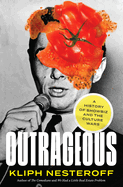
Bad news for those who like to fume that this is a time of unprecedented offense-taking and oversensitivity: Kliph Nesteroff's eye-spinningly illuminating probe, Outrageous: A History of Showbiz and the Culture Wars, offers evidence that, for good or ill, it has ever been thus.
Nesteroff (The Comedians) traces American show business back to the 1830s, when blackface minstrel shows generated complaints, but not every grievance since then has been as well-founded. As Nesteroff marches chronologically through a history of public outrage, barely a paragraph goes by that won't inspire a face-palm or a face-plant. In 1919, New York City tried to ban the shimmy because the dance was "unladylike" and "shameless evidence of debauchery." Decades later, two prominent evangelists went after Simon & Garfunkel's ballad "Bridge over Troubled Water" because they believed it was a "paean to heroin." A piece of entertainment might be attacked from both sides, as when the right denounced the 1992 film Basic Instinct for its sexual explicitness and the left decried its homophobia.
Nesteroff submits that there's no less freedom of expression today: "The haters and complainers of social media are used as evidence that 'you can't joke about anything anymore,' but the same argument existed in the 1950s and '60s when the majority of complaints came through the mail." Outrageous can sometimes read less like a well-argued case than like a catalog of ridiculousness, but it's a valuable record, and its dozens of examples are themselves worthy of, if not outrage, then a chuckle. --Nell Beram, author and freelance writer

